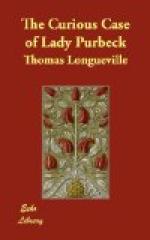Although Sir Kenelm Digby, the King and the Queen of France, Cardinal Richelieu, and the French Ambassador at the Court of St. James’s did their best to obtain forgiveness for Lady Purbeck, Charles I. was long obdurate. At first, as we have seen, he had sent a writ commanding her to return at once to her native country for punishment. When he had withdrawn that writ, he for some time refused to allow her to return at all, for any purpose. But troubles were brewing for Charles himself, and, after Lady Purbeck had spent an exile of some length in Paris, she was permitted to come to England, without any liability to stand barefoot in a white sheet for the amusement of the congregation in a fashionable London church on a Sunday morning.
FOOTNOTES:
[95] S.P. For., Charles I., France. Scudamore to Coke, 25th March—4th April, 1636. This letter was addressed to Sir John Coke, the Secretary of State.
[96] Court and Times of Charles I. By D’Israeli, Vol. II., p. 242.
[97] S.P., Charles I., France. Scudamore to Windebank, I/121 July, 1636.
[98] S.P. Dom., Charles I., Vol. CCCXLIV., No. 58. Sir Kenelm Digby to Edward Lord Conway and Kilultagh, 21/31 January, 1637.
[99] Wimbledon was Governor of Portsmouth and the letter in question was probably one mentioned by Walpole in his Royal and Noble Authors, to the Mayor of Portsmouth “reprehending him for the Townsmen not pulling off their hats to a Statue of the King Charles, which his Lordship had erected there.” Such an “epistle” might well excite the derision and contempt of Sir Kenelm.
[100] The author of Annales Ecclesiastici.
CHAPTER XIII.
“To err is human, to
forgive divine.”
POPE.
Concerning Lady Purbeck’s life, after her return to England, we have the following evidence from Coles’ Manuscripts. Let us observe, first, that in the extract there is a mistake. It was not Lady Purbeck, but the wife of her son, whose maiden name was Danvers. Anybody who may choose to discredit the whole, on account of this error, can do so if he pleases; but it is certain that Lord Purbeck “owned the son” and that the son’s grandson, “the Rev. Mr. Villiers,” claimed “the Title of Earl of Bucks.” Therefore we see no reason for doubting the statement that Lord Purbeck “took his Wife again.” The “after 16 years” would seem to tally with the undoubted facts.
“[101]Lady Purbeck’s name Danvers; absent from Husband 16 years: had by Sir Robert Howard one son who married a Bertie, and took the Title of Lord Purbeck, which Lady Purbeck’s will I have. Lord Purbeck after 16 years took his wife again, and owned the Son, which 2nd Lord Purbeck had one Son, Father of the Rev. Mr. Villiers, who now claims the Title of Earl of Bucks. &c.”




